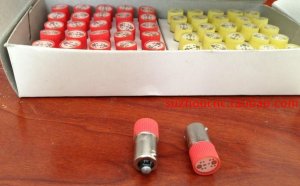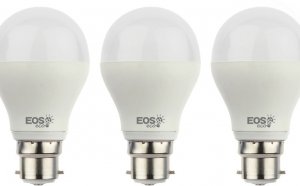
About LED bulbs
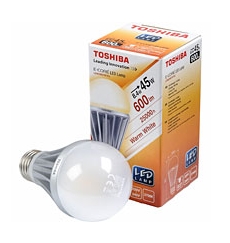 LED lights being hailed once the future of house illumination because they use little energy, claim to last a long time and, unlike regular energy-saving light bulbs, they're instantly brilliant when started up.
LED lights being hailed once the future of house illumination because they use little energy, claim to last a long time and, unlike regular energy-saving light bulbs, they're instantly brilliant when started up.
As Light-emitting Diode lights for residence usage are relatively new, they tend becoming the most costly variety of energy-saving bulb and are primarily for sale in lower brightnesses. However, the technology is building quickly so that as LEDs be a little more popular, they are decreasing in price.
LED light bulbs change from traditional incandescent light bulbs in the way they produce light. While old-fashioned incandescent bulbs passed electricity through a filament, LEDs create light with the use of a semi-conductor that gives off light power when an electric present is passed through it.
In this manner of making light can be different from regular energy-saver bulbs, which go energy through mercury vapour to create UV light. This is then absorbed by a phosphor layer inside lamp, causing it to radiate.
What are LED bulbs great at?
LEDs are the most high-priced style of regular lights you'll see when you look at the stores, however they do have advantages on the other styles of bulbs.
- LEDs will be the most energy-efficient bulbs. They normally use 90percent less energy than old-fashioned incandescents and that can sometimes pay money for by themselves through power cost savings in just a couple of months. Compact Fluorescent Lamps (CFLs) are the most common variety of energy-saver bulb, and so they utilize 60%-80percent less than incandescents. Halogens use 20-30per cent less
- LEDs claim become ultra long-lasting - enduring for 25-30 many years, dependent on which one you buy and how you employ it
- LEDs give out their light almost instantly when you flick the light switch, so that you don't have to put up with dim light while they progress
- Our examinations are finding that LED and halogen light bulbs work fine in reduced temperatures, whereas CFLs don't
Exactly what are the downsides of LED light bulbs?
Light-emitting Diode bulbs make use of 90percent less power than incandescent light bulbs
- The LED marketplace is presently a self-regulated marketplace, therefore a CE mark on the light bulb cannot indicate so it is through all required quality checks. So that the quality of Light-emitting Diode bulbs can vary. Have a look at our independent reviews to ensure that you will get a reliable light bulb - visit Light-emitting Diode light bulbs ranked.
- Until recently, Light-emitting Diode lights were usually just been available in lower wattages and lumen levels than many other types of light bulb. So while they are fast to reach their full brightness and experience no decrease in performance as time passes, they are often only available in dimmer types than CFL and halogen light bulbs. This will be enhancing everyday, but with brighter LEDs becoming readily available
- Some people do not like the top-notch light provided by Light-emitting Diode light bulbs, as some can create a cooler bluish light. The very best LEDs may be indistinguishable from your old incandescent light bulbs and be able to create a nice cozy light
- We heard some instances when a small amount of Light-emitting Diode bulbs can restrict DAB radio indicators. We try all light bulbs for this irritating anomaly so that you won’t a bit surpised when you are getting it home and switch it on
- To be able to dim Light-emitting Diode lights you may have to upgrade to a dimmer that recognises low electric lots.
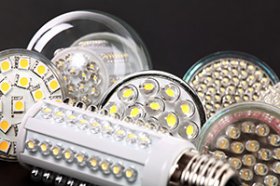 The packaging should state whether LEDs tend to be dimmable, but check with the company if you're not sure
The packaging should state whether LEDs tend to be dimmable, but check with the company if you're not sure - CRI or Colour Rendering Index which can be a measure of how well a light source precisely reveals various tints. Halogen and old-fashioned incandescent enter the high 90s about this measure. For the time being, the greatest LEDs have a score when you look at the middle 80s.
Must I get Light-emitting Diode light bulbs?
Yes. These bulbs will be the most energy saving, they're long-lasting and acquire brilliant the instant you flick the light switch. Be sure you view our light bulb rankings before you buy, as high quality can vary.
Get one LED bulb initially, to see if you want the spread and colour of light before committing to replacing even more light bulbs in your home.
This will be a fast-paced marketplace so you could find that if an individual of one's new LEDs fails after per year, you do not have the ability to get a hold of the identical replacement. To prevent an innovative new light bulb having a new scatter or colour of light as to what you already have, buy an extra replacement light bulb at the time of your preliminary buy.
Pros: LEDs are the best types of bulb, have great reported longevity, provide instant light, operate in reduced temperatures
RELATED VIDEO
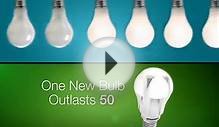
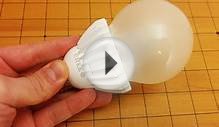

Share this Post
Related posts
Information about LED bulbs
Q: What’s regarding the Light-emitting Diode Lighting information label? A: The LED lighting effects details label enables…
Read MoreEco LED bulbs
LED vs. CFLs vs. Incandescents Light-emitting Diode bulbs make use of 85% less power than incandescent bulbs, and last 20…
Read More
